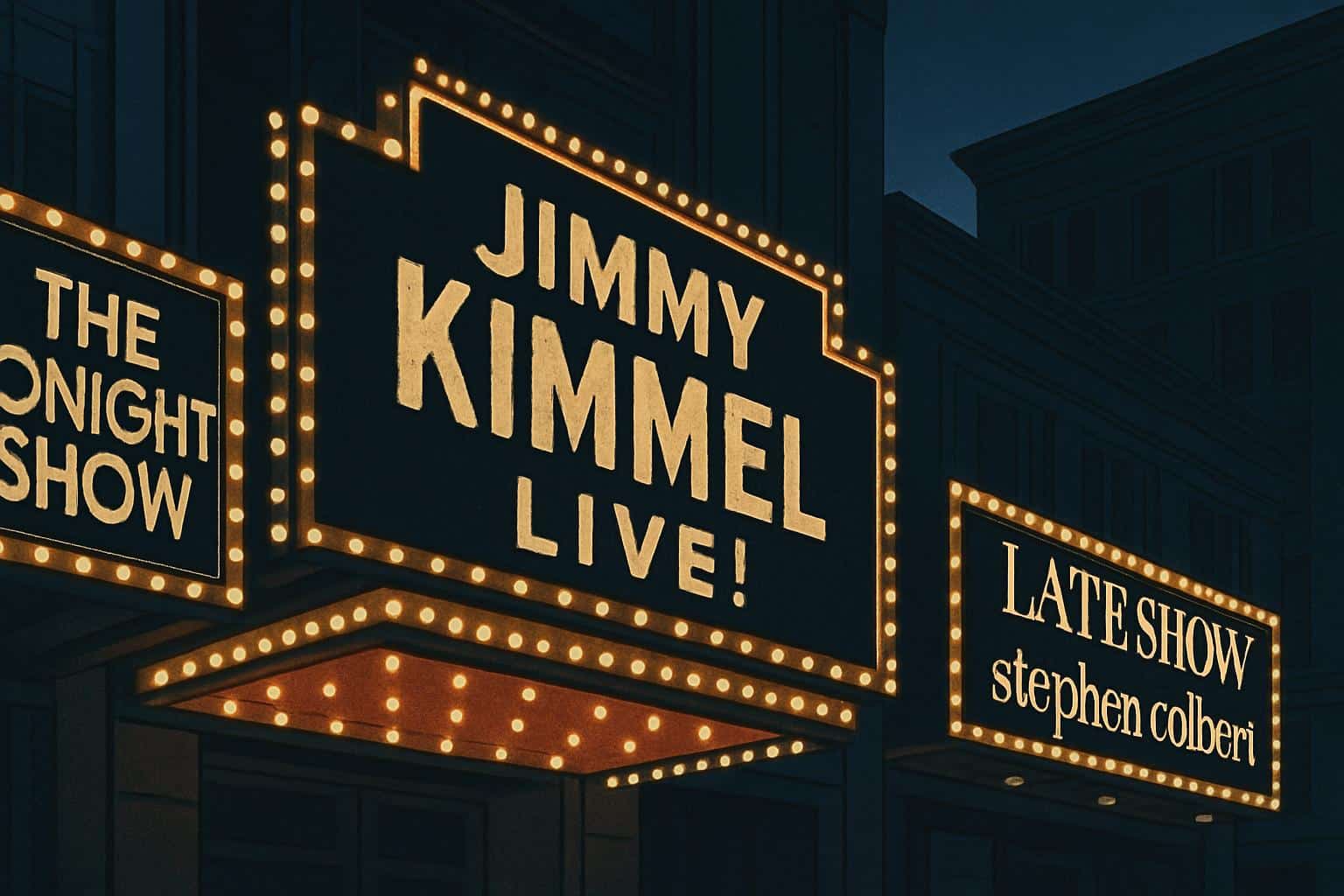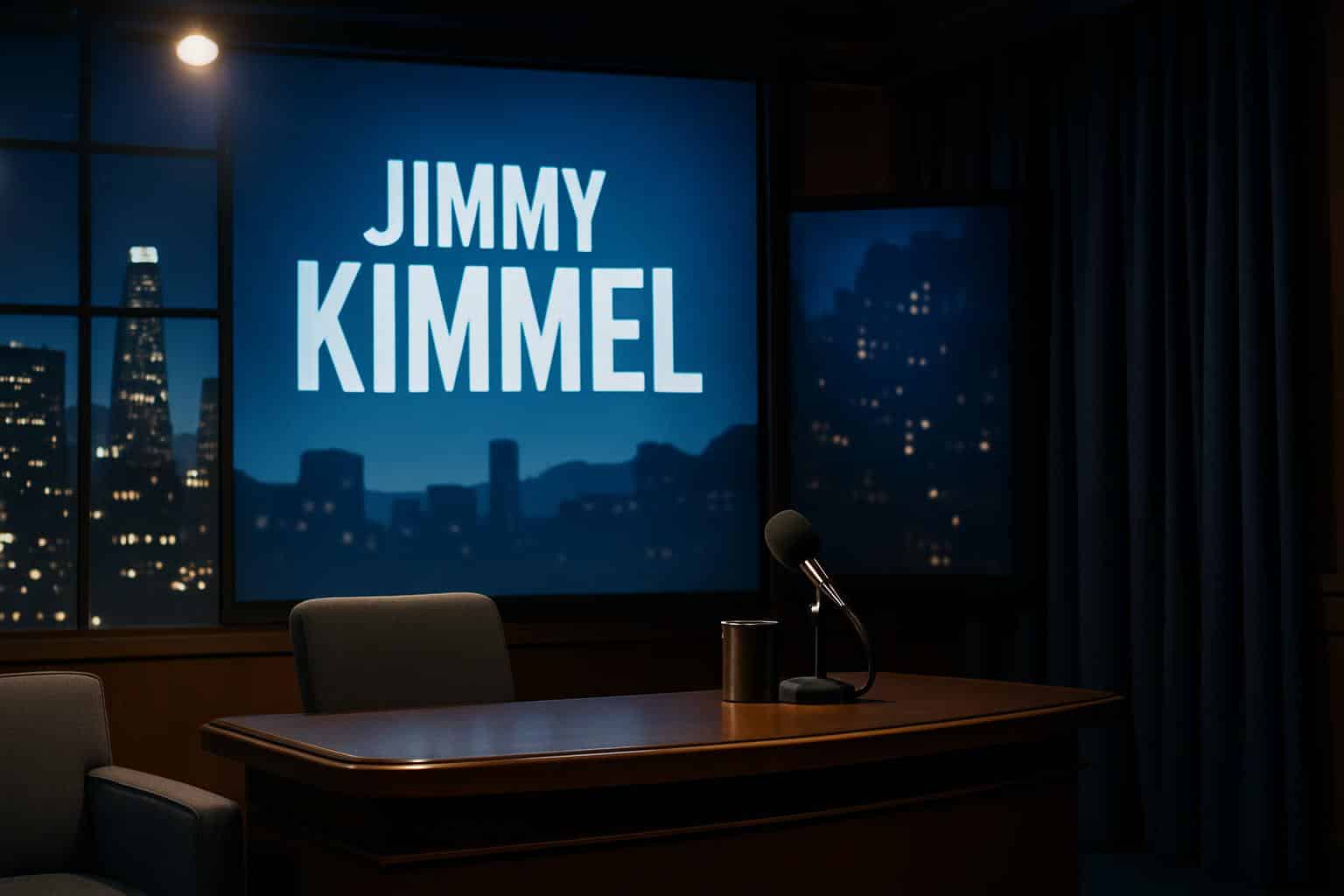ABC’s decision to remove Jimmy Kimmel from the air provoked an instant, unusually united reaction from his fellow late-night talk show hosts — who painted it as a test of free speech on broadcast television. Within hours, Seth Meyers, Jimmy Fallon, Stephen Colbert and Jon Stewart used their monologues to not only defend Kimmel but sound the alarm about political pressure seeping into programming decisions.
Meyers: A joke, a pivot and a civics lesson
Seth Meyers began with a head fake — satirizing the notion that any criticism of the president before this was “just AI” — before getting to a sharper point: government signaling consequences for satire isn’t returning free speech; it’s chilling it. He directly contrasted the administration’s own statements about protecting speech with news of Kimmel’s suspension, and highlighted the contradiction.

Meyers framed the dust-up as larger than one host or one network. His refrain — that there’s a reason the First Amendment was first — doubled as a reminder that, while heavily regulated, broadcast TV is ultimately beholden to constitutional rights. For instance, media-law scholars have long observed that efforts to punish speech based on viewpoint would provoke serious First Amendment scrutiny, a point civil liberties organizations like the A.C.L.U. frequently stress.
Fallon: Solidarity with a nudge toward self-censorship
Jimmy Fallon banked on incredulity and chumminess. He cracked wise about people mistaking him for the other Jimmy and vowed not to change things up on “The Tonight Show.” Then, in a visibly hammy moment, he “dubbed” over what could have been scathing lines about the president with saccharine words of praise — an on-the-nose joke at how self-censorship can start to take hold when creatives are too scared to speak out.
Fallon’s tone was breezy, but the subtext was similar: late-night hosts are going to keep making fun of power. The devices of phony reverence, overblown compliment and ostentatious bleeping were time-honored methods to say the thing without saying the thing.
Colbert: Pressure and the business context
Stephen Colbert didn’t mince words, calling Kimmel’s ouster “censorship” and noting that once a line is crossed, further demands come.
And he cited comments from FCC officials which, in language that Wheel might use and drawing on tattoos of his own, would be his way of saying it spelled trouble for ABC — statements different than those made in the past about satire’s vital role as a check on power.
Colbert also highlighted the political economy around broadcast: station license renewals, affiliate leverage and giant merger deals that rely on federal good will. He pointed to industry players — Nexstar on the affiliate side and Disney’s sports ambitions — as examples of how regulatory choke points suddenly become pressure points. Though his framing was humorous, the subtext echoes a point that media analysts often make: when business concerns intersect with politics, creative choices can become leverage.

Stewart: Lampooning obedience to reveal the stakes
Jon Stewart went the long way between point A and point B, parodying deference to power. He presented a “compliance-friendly” edition of his show, hyped some fake science examining the presidential talent meters and aired a montage pitting fervent defenses of Kimmel’s suspension against years of hyperbolic cable-news claims. The point: if “making things up on TV” is the new red line, then we all know enforcement is always selective.
Stewart’s bit landed because it was a reversal of the onus — if satire is being policed while misinformation is permitted to flourish, the target isn’t decency; it’s dissent. Groups like PEN America have highlighted that dynamic in the past, warning that political retaliation against cultural speech can create a broader “chilling effect.”
Why this late-night backlash is important
Small-screen entertainment, however, has an outsized reach these days. According to Nielsen figures, individual series average in the low-to-mid millions on linear TV, but clips routinely rack up far larger audiences across social platforms, extending monologues into next-day news. Roughly one in five U.S. adults get at least some political news from late-night content, Pew Research Center has reported — a reminder that jokes can set agendas.
But the broadcast networks function within a specific regulatory framework; the First Amendment for them doesn’t create exemptions for unwelcome commentary. Legal experts have warned for years that government threats connected to content can be unconstitutional, even when run through license or merger processes. That is partly why the line between critique, pressure and punishment is being parsed so closely here.
What to watch next in the late-night fallout
ABC has provided no timeline for Kimmel’s return, leaving ad buyers and affiliates, as well as viewers, guessing. Meanwhile, his rivals are sending the message that if it’s silence you’re serving up, they would just as soon pass. If anything, this may be the round of shows with sharper monologues and a little more meta-comedy about censorship as hosts who have been trying to work out what can be said — and how loudly it can be said — on network TV.
The larger question is whether this moment represents a precedent. If high-profile satire can be put on the sideline under this kind of political heat, other shows will take notice. For now, late night’s message is obviously one that goes beyond the simply informative: They don’t just regard Kimmel’s absence as a programming quirk to be rationalized, but a threat — and they are going to offer their response in the most late-night way possible: with jokes that double as pushback.

